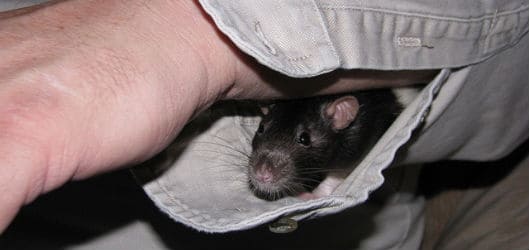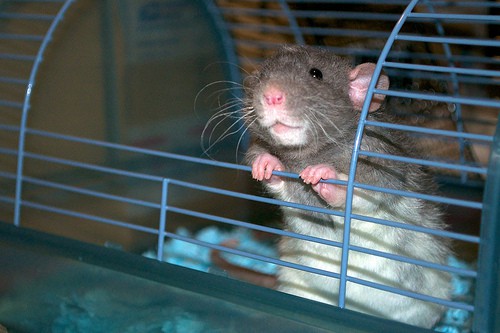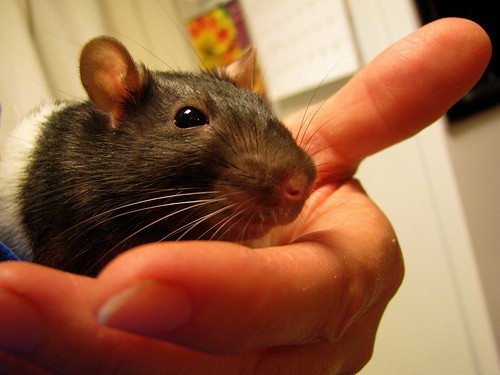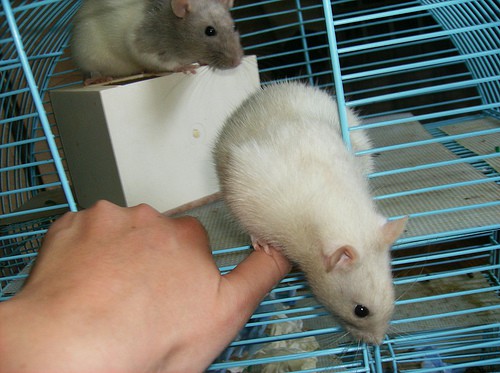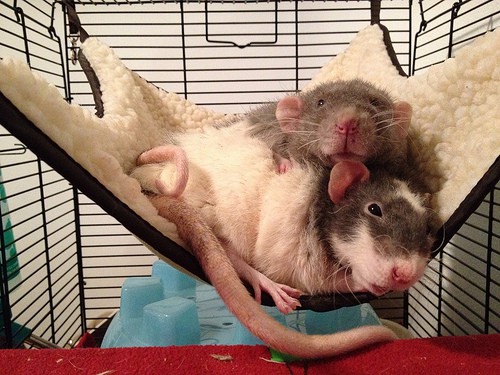Rats
Pet rats make good companions
While the thought of keeping a rat may put off some people, there are many misconceptions about these furry creatures. Rats are affectionate, intelligent, and clean animals that can provide their owners with companionship. Pet rats are related to their wild brown rat ancestors, but they have been bred for over a hundred years to develop a range of attractively marked and friendly animals with different behaviours from their wild cousins. Rats are rewarding pets because they become close to their owners, are sensitive, yet playful, and can be taught tricks and learn to come when their name is called.
Rats require more maintenance compared to other rodents that are kept as pets. They require to play outside their rat cage and require greater amounts of attention to avoid boredom and isolation. Their environment should provide them with stimulation.
Buying pet rats
When it comes to purchasing a pet rat, it is best to consider buying one from a reputable breeder. Baby rats, called kittens, should have been used to being held from an early age so that they are accustomed to being handled and socialised with people and other animals. Many pet rats are purchased from pet stores. Care should be taken to ensure that the rats from a pet shop look healthy, as they may be stressed because of the move from a quiet home to a busy shop, or may have picked up diseases from other rats or pets in the store. Always ask where the pet shop sources its stock, as small specialist breeders are preferred to rat farms where rats are bred in large numbers and do not receive the same care and attention.
No matter the source of your pet, you need to be able to handle them and notice how friendly and well adjusted your rat is. Ideally, pet rats should be young and curious, and in good health. Reputable breeders will ensure that the kittens they sell will be healthy and good quality, and be about six weeks old. Male and female rats should be housed separately to prevent unwanted litters. A responsible breeder or pet shop should ask you questions to assure themselves that you are a responsible person who has the best interests of your pet in hand, which includes considering how you will house your pet when you bring it home, how much time you can devote to your pet, and what you will feed it.
Pet rats can live for three years or longer, so you need to consider this when purchasing one. You need to be able to spent time with your pet on a daily basis, so if you life or work schedule is likely to prevent this, then it may not be a good idea to purchase a rat as a pet.
Handling your pet rats
Rats are social animals and love lots of human contact. This is especially important when you first bring your pet home, as your rat needs to get used to you and his surroundings. Encourage your pet rat to go with you around the house in your sweater or on your shoulder so that he can see his surroundings and explore its sights and sounds.
As your rat explores the house, you will probably need to consider how you can rat-proof your home to make sure he cannot get into spaces that he cannot be easily taken out of. Pet rats need to chew things to keep their teeth in good condition, so anything that can be nibbled will be from cables, books, skirting, etc. Watch out for houseplants that can be poisonous or pots where your rat might dig your plants out.
Housing rats
Pet rats should be kept indoors as they are not as hardy as rabbits and guinea pigs. As pet rats are adept at escaping by chewing through wooden enclosures, it is best to consider a cage, which is placed anywhere where the temperature is not allowed to drop below 7 degrees Centigrade or rise above 24 degrees Centigrade. As rats love to see what is going on around them, the cage should be placed in the busy areas of the house. Situating the cage near your eye level on a shelf or similar will encourage you and other members of the household to interact with your rat when passing by him.
The size of the cage should be a minimum of 60 centimetres long by 60 centimetres high and 30 centimetres wide; however, it is important to stress that bigger is better when it comes to the size of the cage, as it helps make your pet’s environment more interesting when he cannot be let out to explore or play. No matter the size of the cage, it is important that pet rats receive time outside their cage every day.
Wire cages are preferred because they provide your pet’s home with some ventilation, which is important as rat faeces and urine gives off a potent smell of ammonia that can affect the respiratory system of your rat and make him unwell. The wire of the cage provides many opportunities for your pet to climb, and if the cage is of sufficient height, he can climb ropes and other structures to reach higher points in his cage. You can feed your pet through the bars and he can pick up smells and senses passing to him through the bars. Choose a cage with a solid floor so that you can place litter on the cage floor to absorb urine and droppings, which makes cleaning the cage simple, as the plastic base found in many cages is hygienic and easy to clean.
Feeding rats
Pet rats eat a wide range of food including wholesome fresh 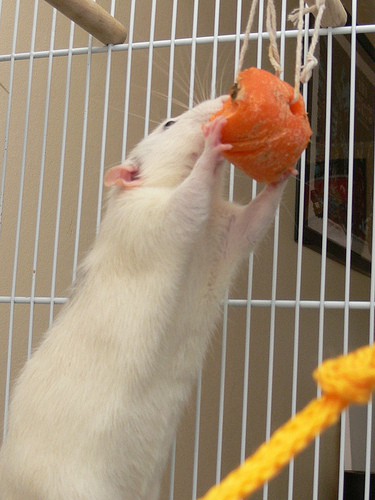 items such as brown rice,fruit and vegetables, and protein can provide a good base for a diet. Protein can be provided by small amounts of high protein dog food. Fatty foods, such as sunflower seeds and peanuts, should be avoided as they can cause an increased risk of tumours in rats. Similar to human diets, everything fed to a rat should be in moderation including commercially available dried and pellet foods.
items such as brown rice,fruit and vegetables, and protein can provide a good base for a diet. Protein can be provided by small amounts of high protein dog food. Fatty foods, such as sunflower seeds and peanuts, should be avoided as they can cause an increased risk of tumours in rats. Similar to human diets, everything fed to a rat should be in moderation including commercially available dried and pellet foods.



